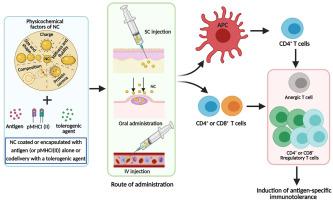Journal of Controlled Release ( IF 10.8 ) Pub Date : 2021-09-29 , DOI: 10.1016/j.jconrel.2021.09.037 Faezeh Dangkoub 1 , Mojtaba Sankian 2 , Mohsen Tafaghodi 1 , Mahmoud Reza Jaafari 3 , Ali Badiee 1

|
Immunotolerance induction in an antigen-specific manner is the long-term goal of immunotherapy to treat autoimmune diseases. Nanocarriers (NCs) can be designed as a new generation of delivery systems to modulate the immune responses through targeted delivery of antigens and immunomodulators to antigen presenting cells (APCs). In this manuscript, several formulation factors in the preparation of NCs which affect their uptake using APCs and generation of tolerance have been reviewed. The physicochemical properties and composition of NCs have been shown to play essential roles in achieving the desired immunological outcome. Also, targeting of dendritic cells and macrophages as APCs and direct targeting of the autoreactive lymphocytes have been presented as two main ways for induction of antigen-specific tolerance by these tolerogenic nanocarriers (tNCs). These particles herald a promising approach to treat or even prevent unwanted immune reactions in humans specifically.
中文翻译:

纳米载体在自身免疫性疾病中诱导抗原特异性免疫耐受的影响
以抗原特异性方式诱导免疫耐受是免疫疗法治疗自身免疫性疾病的长期目标。纳米载体 (NCs) 可以被设计为新一代递送系统,通过将抗原和免疫调节剂靶向递送至抗原呈递细胞 (APC) 来调节免疫反应。在这份手稿中,综述了在 NCs 制备中影响它们使用 APCs 吸收和产生耐受性的几个配方因素。NCs 的理化特性和组成已被证明在实现所需的免疫学结果方面发挥着重要作用。还,靶向树突状细胞和巨噬细胞作为 APCs 和直接靶向自身反应性淋巴细胞已被提出作为这些致耐受性纳米载体 (tNCs) 诱导抗原特异性耐受的两种主要方式。这些粒子预示着一种有前途的方法,可以专门治疗甚至预防人体中不需要的免疫反应。


























 京公网安备 11010802027423号
京公网安备 11010802027423号